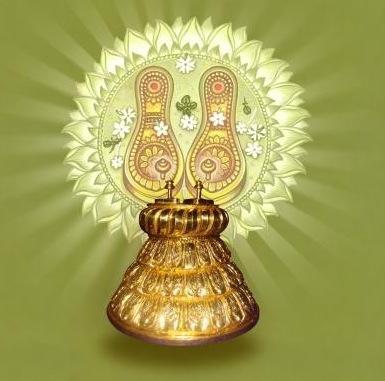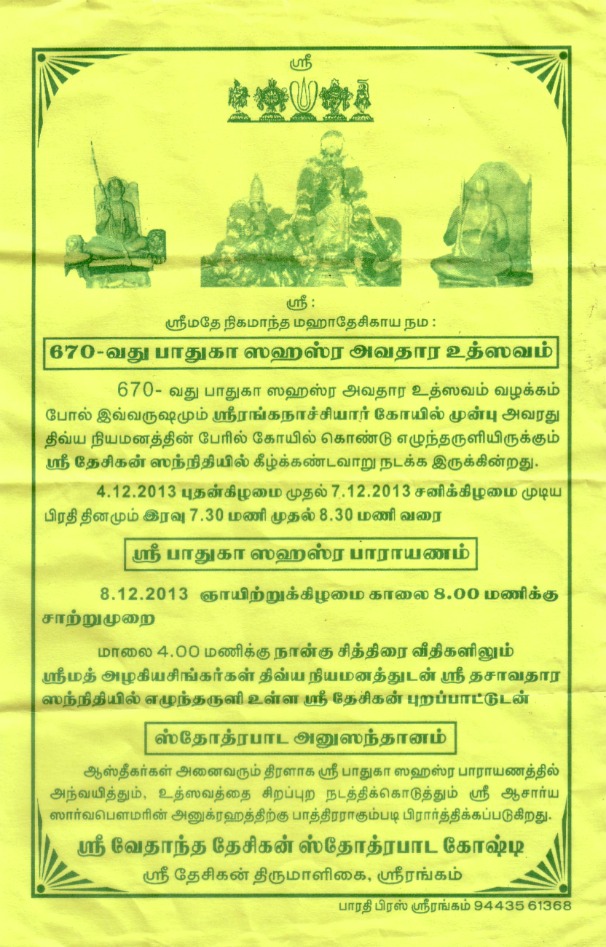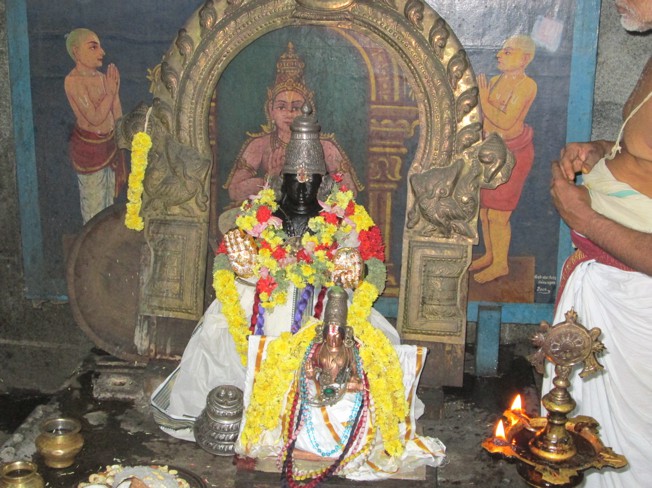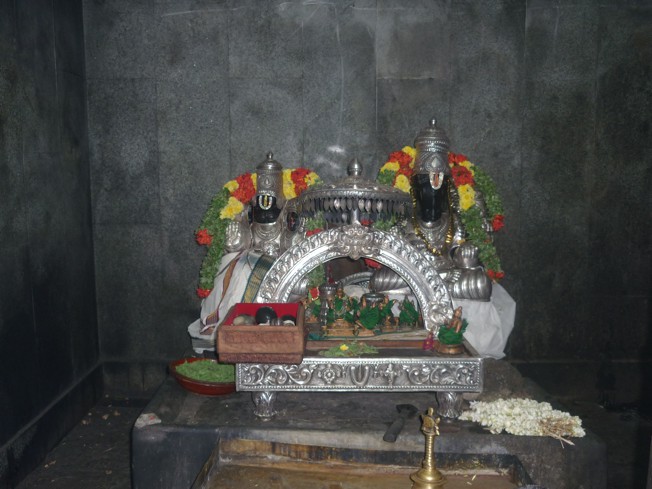The 670th Paduka Sahasram Avathara Utsavam will be celebrated in a grand manner from December 4 to 8, 2013 at Ul Desikan Sannidhi, Sri Ranganathaswamy Temple, Srirangam. There will be Paduka Sahasra parayanam everyday between December 4th to 7th from 7:30 pm to 8:30 pm. On the final day, Satrumurai will take place at 8 am in the morning. In the evening, there will be purappdu for Swami Desikan of Dasavathara Sannidhi around the four Chithra Veedhis.
In this multifaceted master-piece of a kavyam of Sri Ranganatha Paduka Sahasram (or Sri Paduka Sahasram), Swami Desikan has celebrated the glories of the two Padukas (sandals) adorning and supporting the lotus feet of the Lord of Srirangam. This suprasiddha (highly revered) kavyam has 1,008 verses housed in 32 chapters (Padhathis). Sri Paduka Sahasram is one of the most magnificent literary, philosophical and theological compositions of Swami Desikan.
It is said that Swami Desikan composed all of these 1008 verses in one Yamam of a night in response to a challenge set by a Srivaishnava in Srirangam. The SrivaishNava challenged Swamy Desika and suggested that whoever completes 1,000 slokams on ANY subject of his choice in ONE NIGHT will be the winner of the title as the MahA Kavi. Swami Desikan was least interested in acquiring the title or entering into a competition with the ego-driven local poet/ SrivaishNavA of Srirangam. He accepted however this challenge as a command of Sri RanganAthA for him to compose a eulogy on HIS anantha KalyANa guNams. Swami chose the subject of the sandals of the Parama Purushan of Srirangam and created the 1,008 verses celebrating their glories. The competitor chose the subject of the Paadha Kamalam of Sri Ranganatha and barely completed 300 verses during the course of the night and gave up his futile attempt. On the next morning, Swami Desikan presented to the Lord of Srirangam his grantham entitled, “Sri Ranganatha Paduka Sahasram” at the temple and was duly honored by the scholars and devotees assembled there and most importantly received the blessings of the Lord Himself.
According to another version, Swami Desikan settled down in Srirangam after many years of residence at Thiruvahindrapuram and was engaged in the SiddhAntha Pravachanam to his disciples. His MedhA vilasam and brilliance in interpreting Bhagavadh RaamAnuja SiddhAntham was admired by the residents of Srirangam. A group of scholars appealed to Swami Desikan at this time to compose an Uttama Kaavyam on the Lord of Srirangam to celebrate the unmatched devotion of their AcharyA to Periya PerumAL. Swami Desikan accepted their wish as the Lord’s command and composed the bhakthi-laden verses of Sri Ranganatha PadhukhA Sahasram. In that extraordinary kavyam, he explained that the Lord’s sandals and NammAzhwAr are one and the same. He pointed out further that the sacred sound arising from the movement of the Lord on His Padukas is equal to the sacred sound of Thiruvaimozhi arising out of Sri SatakOpA’s mouth and Sri Paduka Sahasram emanating out of his own mouth.
The individual verses arising from the power of Swami Desikan’s Hayagreeva mantrOpAsanam are very powerful in their mAntric significance. The Andavans of Srirangam, who worship the Mani Padukas of Sri RanganAthA in their daily Aradhanam have identified individual slokAs for japam and DhyAnam to realise specific siddhis. It is said that the individual verses have tremendous mantra siddhi and karya siddhi. For instance, slokas from the Chitra Padhathi (the 7 Yanthrams picked for the seven days) are very auspicious for worship by the ladies of the house. Ladies may draw these Yanthrams in the pujA grahams of their houses as kolams (RangOlis) as the accompaniment to the japam and to invoke (aavAhanam) of the Lord wearing His sandals (Lord and NammAzhwAr) on individual days of the week.
(Thanks to Sri Oppiliappan Sadagopan Swami for the above write-up, kindly also please visit http://anudinam.org/2012/01/16/paduka-sahasram-prologue/ )
Our Poorvacharyas have strongly recommended the parayanam (recitation) of the 32 Padhathis of Sri Paduka Sahasram everyday (pratidinam/anudinam). Those who do so are sure to receive the blessings of Swami Desikan and become His paramabhaktas. Out of his love and grace towards the shishyas and abhimanis, the present pontiff of Srirangam Srimad Andavan Ashramam, Sri Rangaramanuja Maha Desikan (Sri Mushnam Andavan) has recommended a chart for daily recitation (pratidina parayanam) of Sri Paduka Sahasram. The parayanam must be started on Anusham, the Thirunakshtaram of Sri Nathamunigal who revived and reestablished the Sri Vishstadvaita Sampradayam, and completed on Visakam, Sri Namazhwar’s thirunakshatram. According to the recommended chart, Chitra Padhathi must be recited on Chitrai nakshtram and Nirveda Padhathi on Swathi nakshtram. For Nitya Parayanam series in anudinam, please visit this link http://anudinam.org/tag/nitya-parayanam-of-sri-paduka-sahasram-by-nakshatram/
The following is the related pathrigai for the utsavam at Srirangam this year…












